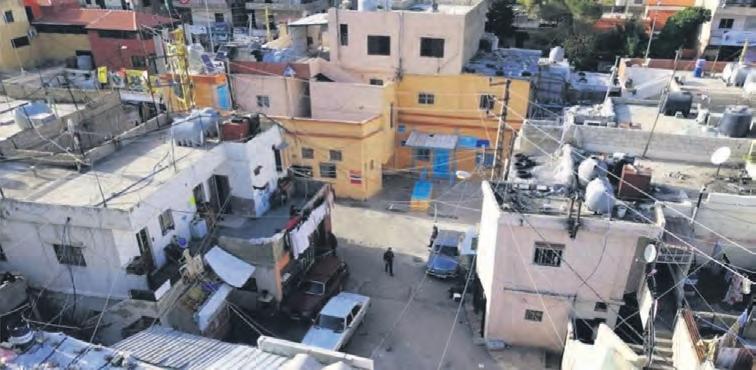
3 minute read
Guess who’s coming to dinner?
by AMUST
As we end this Ramadan, the Recipes for Ramadan collection of recipes and stories will have grown to more than 65 recipes from 25 countries.
It started exactly 3 years ago as an online, community and social media project in response to the first COVID-19 lockdown which meant that face to face Iftars, indeed any of the normal social events held during Ramadan, simply weren’t possible.
Advertisement
The idea then was to pivot what had been a TV idea into a kind of virtual iftar that could continue to extend hospitality, share food and host the kind of conversations we might have over a shared meal, conversations that are every bit as important as the food. The conversations in the main took the form of first-person narratives exploring each contributor’s backstory, the country of their family’s origin, memories of their ancestors and the cuisine of that country of origin.
Along the way, the project, in which AMUST is the community media partner, has picked up the NSW Premier’s Multicultural Communications Award for Best Use of Digital or Social Media and has been featured each year in mainstream media too: SBS, ABC Local Radio, ABC Radio National and Guardian Australia.
Each year since 2021, the Guardian has run a five- or six-part series, taking both the food and the ‘conversation’ to a wider audience each week of Ramadan. This year they wanted to create a kind of menu: something for suhoor, a snack, a fish main, a meat main and a dessert or sweet.
The dishes they chose were not ones we’d filmed in the first couple of years when funding from community partners meant we could film professionally with some of Australia’s best-loved Muslim foodie influencers, so it also required running a kind of test kitchen at home, taking new photographs and video-ing the process to make short social media reels.
We started with Taysir Ghazi’s Ful Medames as a traditional Egyptian suhoor dish. We used dried fava beans rather than tinned, so the process took longer with soaking and simmering than it had done with the tinned beans we used when running an Iftar Kitchen with Penny Appeal last year. The finished dish was also a much darker brown but serving it four ways as Taysir does was absolutely delicious… and the Guardian’s Lifestyle team liked the photos!
Farukh Tahery’s Afghan Bolani was next on the menu: a kind of stuffed sourdough flatbread that can be eaten alone as a snack, as a side with the mains or for breakfast/suhoor.

If you haven’t tried it before, it’s straightforward only requiring that you’ve got some sourdough starter on the go or can plan ahead.
Farukh and her family were evacuated from Afghanistan following the fall of Kabul in August 2021 and their story, like each story, is worth taking a moment to read, perhaps while the dough rises.
The fish dish was Sivine Tabbouch’s Samkeh Harra, a recipe from the Lebanese port of Tripoli inherited from Sivine’s mother. My mother and I had attended Sivine and her daughter Karima’s Sunday Kitchen cooking class just before Ramadan and took the need- ed photos there before we also tested the recipe at home with friends.

Teasing out Sivine’s story made us wish we could visit Tripoli and filled us with awe at her mother, a courageous and stoic woman who fled Tripoli to prevent her sons still living at home from becoming involved in the sectarian violence of civil war.
It was important this year to share Beyza Koca’s recipe and story which drew on her family roots in Gaziantep, the centre of the recent devastating earthquake which wreaked so much destruction on Turkey and Syria. Beyza had shared her recipe and story and her dream of one day living in Gaziantep in 2020 and now it seemed important to share what Gaziantep was like before it was destroyed.
Thought of as the Paris of South East Turkey, the city was recognised by UNESCO as one of the gourmet capitals of the world and comes alive as you hear of Beyza’s father’s youth and their extended family still living there.
Finally, the sweet rounding off this year’s Guardian series was Sally Mousa’s Qatayef Five Ways, a traditional Ramadan street food in Palestine which she’d learnt when she married and has adapted with her daughter to provide both traditional and unconventional fillings.
Ramadan may be over by the time you read this but on the experience of our ‘test kitchen’, Qatayef is definitely a dessert that is fun to make with family and friends and will bring everyone coming back for more.

Hoping these photos will whet your appetite and give you a taste of what’s in the collection. Some are quick and easy, some a bit more fiddly but great fun to make involving friends and family in the process.
All these recipes and edited versions of these stories can be found at The Guardian www.theguardian.com/food/series/recipes-for-ramadan as well as on the Recipes for Ramadan website, www.recipesforramadan/recipes. Just scroll through the recipes, laid out in country order, until you find the country you are looking for.
Do explore the website and follow @recipesforramadan on Instagram.











